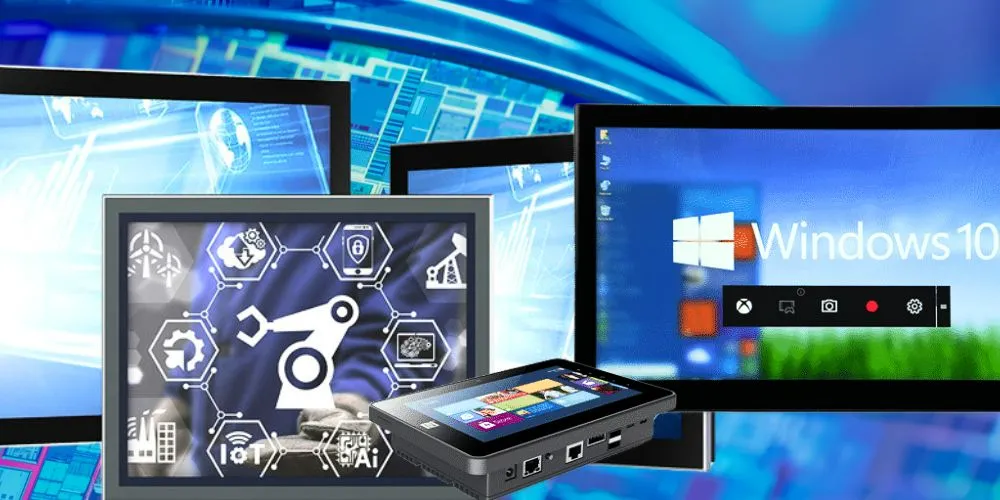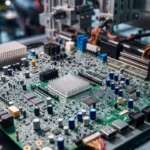In modern computing, Panel PCs have emerged as versatile solutions that seamlessly integrate hardware and software into a single interactive unit. This comprehensive exploration delves into the essence of Panel PCs, tracing their evolution, elucidating their core functionalities, and illuminating their diverse applications that empower industries and businesses to embrace a new era of efficiency and interactivity.
A Fusion of Hardware and Software
The Panel PC converges traditional computing hardware and interactive displays, creating a compact yet powerful unit. It features a display screen with an embedded computer system, enabling users to interact directly with the displayed content using touch or stylus input. This integration simplifies setups, optimizes space, and enhances user engagement, making Panel PCs indispensable tools in various sectors. This marriage of hardware and software represents a pivotal step in computing, where user interaction becomes seamless, intuitive, and direct.
Key Features and Capabilities
Panel PCs boast key features and capabilities that make them uniquely valuable in various contexts.
Interactive Display
At the heart of a Panel PC lies its interactive display, which responds to touch or stylus input. This intuitive interface eliminates the need for separate input devices such as keyboards and mice, streamlining user interaction and enhancing user experience. This tactile engagement transforms how users interact with technology, offering a more natural and immediate form of control.
Compact Form Factor
The combination of a display and embedded computer in a single unit results in a compact form factor. This space-saving design makes Panel PCs suitable for applications where space is limited, such as retail environments, industrial control rooms, and healthcare facilities. Their compactness allows for deploying computing power and interactivity in locations where traditional setups would be impractical or inefficient.
Processing Power
The embedded PCs are equipped with capable processors, allowing them to handle various tasks, from data visualization to application running. This processing power enables real-time data analysis, making Panel PCs valuable tools in industries that require quick decision-making. The computational muscle within these units empowers users to process and interpret data at the speed of thought.
Customization
Panel PCs can be tailored to specific industry needs with various configuration options, including screen sizes, processing capabilities, and connectivity features. This adaptability ensures that each Panel PC can cater to the unique requirements of its intended application. This versatility allows industries to deploy computing solutions that align precisely with their operational demands.
Versatile Applications of Panel PCs
The versatility of the embedded PCs is evident in their wide-ranging applications across industries.
Retail
In retail environments, the embedded PCs power interactive kiosks, self-checkout systems, and digital signage. They facilitate seamless customer interactions, enhance product displays, and enable efficient point-of-sale transactions. These systems create immersive retail experiences that cater to modern consumers’ expectations.
Industrial Automation
Panel PCs are crucial in industrial automation. They serve as human-machine interfaces (HMIs) in control rooms and manufacturing floors. They provide real-time data visualization and allow operators to precisely monitor and control industrial processes. This role is vital in industries where precision and real-time control are paramount.
Healthcare
The PCs are used in healthcare settings for electronic medical records (EMRs), patient monitoring, and diagnostic imaging. They enable healthcare professionals to access and manage patient information efficiently, improving patient care. These systems enhance medical workflows and enable healthcare providers to make informed decisions quickly.
Gaming and Entertainment
Panel PCs are also found in gaming machines, casino displays, and entertainment systems. Their touch-enabled screens offer immersive gaming experiences and interactive entertainment options. These systems create engaging entertainment environments that captivate users and offer novel experiences.
Benefits and Challenges
Panel PCs offer an array of benefits while addressing specific challenges.
Benefits
Integrating hardware and software in those PCs simplifies installation and reduces the need for additional peripherals. They enhance user interaction, streamline workflows, and improve overall efficiency. These benefits translate into enhanced productivity, reduced complexity, and improved user satisfaction.
Challenges
Maintaining the performance and reliability of Panel PCs, especially in demanding environments, requires careful consideration of cooling mechanisms to prevent overheating and ensure long-term operation. Addressing these challenges is essential to ensure the durability and longevity of Panel PC deployments.
Innovations and Future Prospects
Panel PCs are poised for further advancements.
Enhanced Connectivity
As industries adopt the Internet of Things (IoT), embedded PCs will likely incorporate enhanced connectivity options to facilitate seamless data exchange with other devices and systems. This connectivity will enable the integration of Panel PCs into larger IoT ecosystems, enhancing their role in data-driven operations.
Artificial Intelligence
Integrating AI capabilities into the embedded PCs could enable intelligent data analysis and decision-making directly at the point of interaction, enhancing the efficiency and relevance of the information presented. AI-powered PCs could provide users with context-aware insights that enhance decision-making processes.
Conclusion
The Panel PC bridges hardware and human interaction, revolutionizing how industries operate, and users engage with technology. Its integrated design, intuitive touch interface, and adaptability empower businesses to deliver enhanced user experiences and streamline operations. As industries continue to embrace digital transformation, the embedded PCs serve as windows to a future where interactivity and efficiency converge, propelling us toward a new era of technological advancement and human-computer collaboration. In a world where user engagement and operational efficiency are paramount, Panel PCs offer a glimpse into a future where every touch brings us closer to enhanced interactivity and efficiency.





